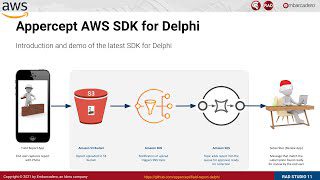
Author: Embarcadero USA
Question and Answer Database
FAQ1778D.txt Extracting Icons
Category :Windows API
Platform :All
Product :All 32 bit
Question:
How can I use the undocumented ShellAPI function ExtractIconEx()
to extract the small and large icons from a given file?
Answer:
You can use the undocumented ShellAPI function ExtractIconEx() to
extract both large and small icons from an executable file,
dynamic-link library (DLL), or icon file.
The function is prototyped as:
function ExtractIconEx(lpszFile: PAnsiChar;
nIconIndex: Integer;
phiconLarge : PhIconArray;
phiconSmall: PhIconArray;
nIcons: UINT): UINT; stdcall;
Parameters
lpszFile:
Pointer to a null-terminated string specifying the name of the
executable, DLL, or icon file to extract the icon from.
nIconIndex:
Specifies the index of the icon to retrieve. If this value is 0, the
function returns the handle of the first icon in the specified file.
If the value is -1 and phiconLarge and phiconSmall are both nil, the
function returns the total number of icons in the executable, DLL, or
icon file to extract the icon from. If the file is an executable or
DLL file, the return value is the number of RT_GROUP_ICON resources.
If the file is an .ICO file, the return value is 1.
phiconLarge:
Pointer to an array of icon handles for the large icons returned.
This parameter can be nil if only one icon is to be extracted.
phiconSmall
Pointer to an array of icon handles for the small icons returned.
This parameter can be nil if only one icon is to be extracted.
nIcons
Specifies the number of icons to extract.
Return Value
The return value is the handle to an icon if only one icon is to be
extracted. If there were no icons found in the file, the return value
is 0.
The following example demonstrates using the ExtractIconEx() function.
Note that the functions are prototyped differently than as prototyped
in the ShellAPI unit, to allow the full usage of the function.
type ThIconArray = array[0..0] of hIcon;
type PhIconArray = ^ThIconArray;
function ExtractIconExA(lpszFile: PAnsiChar;
nIconIndex: Integer;
phiconLarge : PhIconArray;
phiconSmall: PhIconArray;
nIcons: UINT): UINT; stdcall;
external 'shell32.dll' name 'ExtractIconExA';
function ExtractIconExW(lpszFile: PWideChar;
nIconIndex: Integer;
phiconLarge: PhIconArray;
phiconSmall: PhIconArray;
nIcons: UINT): UINT; stdcall;
external 'shell32.dll' name 'ExtractIconExW';
function ExtractIconEx(lpszFile: PAnsiChar;
nIconIndex: Integer;
phiconLarge : PhIconArray;
phiconSmall: PhIconArray;
nIcons: UINT): UINT; stdcall;
external 'shell32.dll' name 'ExtractIconExA';
procedure TForm1.Button1Click(Sender: TObject);
var
NumIcons : integer;
pTheLargeIcons : phIconArray;
pTheSmallIcons : phIconArray;
LargeIconWidth : integer;
SmallIconWidth : integer;
SmallIconHeight : integer;
i : integer;
TheIcon : TIcon;
TheBitmap : TBitmap;
begin
NumIcons :=
ExtractIconEx('C:\Program Files\Borland\Delphi 3\BIN\delphi32.exe',
-1,
nil,
nil,
0);
if NumIcons > 0 then begin
LargeIconWidth := GetSystemMetrics(SM_CXICON);
SmallIconWidth := GetSystemMetrics(SM_CXSMICON);
SmallIconHeight := GetSystemMetrics(SM_CYSMICON);
GetMem(pTheLargeIcons, NumIcons * sizeof(hIcon));
GetMem(pTheSmallIcons, NumIcons * sizeof(hIcon));
FillChar(pTheLargeIcons^, NumIcons * sizeof(hIcon), #0);
FillChar(pTheSmallIcons^, NumIcons * sizeof(hIcon), #0);
ExtractIconEx('C:\Program Files\Borland\Delphi 3\BIN\delphi32.exe',
0,
pTheLargeIcons,
pTheSmallIcons,
numIcons);
{$IFOPT R+}
{$DEFINE CKRANGE}
{$R-}
{$ENDIF}
for i := 0 to (NumIcons - 1) do begin
DrawIcon(Form1.Canvas.Handle,
i * LargeIconWidth,
0,
pTheLargeIcons^[i]);
TheIcon := TIcon. Create;
TheBitmap := TBitmap.Create;
TheIcon.Handle := pTheSmallIcons^[i];
TheBitmap.Width := TheIcon.Width;
TheBitmap.Height := TheIcon.Height;
TheBitmap.Canvas.Draw(0, 0, TheIcon);
TheIcon.Free;
Form1.Canvas.StretchDraw(Rect(i * SmallIconWidth,
100,
(i + 1) * SmallIconWidth,
100 + SmallIconHeight),
TheBitmap);
TheBitmap.Free;
end;
{$IFDEF CKRANGE}
{$UNDEF CKRANGE}
{$R+}
{$ENDIF}
FreeMem(pTheLargeIcons, NumIcons * sizeof(hIcon));
FreeMem(pTheSmallIcons, NumIcons * sizeof(hIcon));
end;
end;
end.
7/16/98 4:31:28 PM
Article originally contributed by
Reduce development time and get to market faster with RAD Studio, Delphi, or C++Builder.
Design. Code. Compile. Deploy.
Start Free Trial Upgrade Today
Free Delphi Community Edition Free C++Builder Community Edition
Design. Code. Compile. Deploy.
Start Free Trial Upgrade Today
Free Delphi Community Edition Free C++Builder Community Edition






